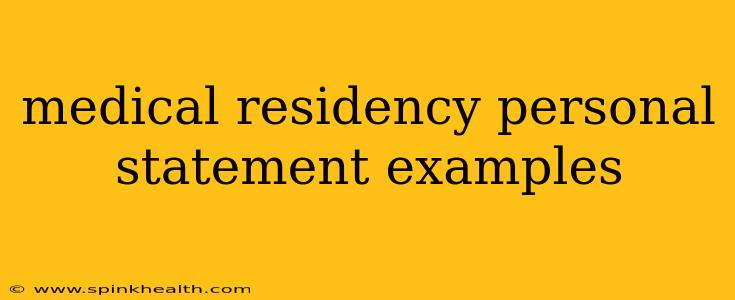Crafting Your Winning Medical Residency Personal Statement: Examples and Insights
The journey to securing a medical residency is arduous, a marathon of hard work, dedication, and meticulous planning. But amidst the demanding curriculum and grueling rotations, one element stands out as pivotal: the personal statement. This isn't just a summary of your CV; it's your narrative, your chance to showcase the unique physician you aspire to be. It’s your opportunity to weave a compelling story that resonates with the residency program directors. Let's explore what makes a strong personal statement, using examples to illuminate the path.
The Essence of a Compelling Narrative
Before diving into specific examples, let's establish the core components of a successful personal statement. It needs to be:
- Authentic: Your voice should shine through. Avoid clichés and generic statements. Let your personality and experiences shape the narrative.
- Specific: Vague statements won't cut it. Use concrete examples to illustrate your skills and qualities. Show, don't tell.
- Focused: Clearly articulate your career goals and why this specific residency program aligns with your aspirations.
- Well-Structured: A logical flow is crucial. Create a compelling introduction, develop your key points, and conclude with a strong closing statement.
- Proofread: Errors undermine credibility. Have multiple people review your statement for grammar, spelling, and clarity.
Example 1: The Unexpected Path to Pediatrics
Opening: "The sterile scent of antiseptic, the rhythmic beeping of heart monitors – these were not the sounds that initially drew me to medicine. My passion ignited unexpectedly, amidst the chaos of a bustling emergency room during a family crisis..."
Body: This statement might then go on to detail a specific experience in an ER that exposed the author to the vulnerability of children and their families, highlighting a particular interaction with a child or parent that sparked an interest in pediatrics. It would emphasize qualities like compassion, resilience, and problem-solving skills, illustrated through specific anecdotes.
Closing: "...My experiences have instilled in me a profound appreciation for the intricacies of pediatric care, and I am confident that [Program Name]'s commitment to [specific program element, e.g., holistic patient care, research opportunities] aligns perfectly with my vision for a fulfilling career as a pediatrician."
Example 2: The Driven Researcher's Journey to Cardiology
Opening: "The intricate workings of the human heart have fascinated me since I first dissected a frog in high school biology. This fascination hasn't waned; it's evolved into a burning desire to contribute to advancements in cardiovascular medicine..."
Body: This statement would focus on research experience, highlighting contributions to specific projects, publications, and presentations. It would emphasize skills like critical thinking, data analysis, and collaboration, and demonstrate a commitment to lifelong learning and innovation.
Closing: "...My research experience, coupled with my clinical rotations at [Hospital Name], has solidified my passion for cardiology. I am particularly drawn to [Program Name]'s innovative research program in [specific area of cardiology], and believe that I can make a significant contribution to your team."
Example 3: The Community-Focused Family Medicine Aspirant
Opening: "Growing up in a small, rural community instilled in me a deep understanding of the healthcare disparities faced by underserved populations. This experience shaped my desire to practice family medicine and provide comprehensive care to patients of all backgrounds..."
Body: This example would highlight experiences working with vulnerable populations, illustrating skills like cultural competency, communication, and advocacy. It would emphasize a commitment to community engagement and providing accessible, quality healthcare.
Closing: "...My experiences have prepared me to serve as a compassionate and effective family physician. [Program Name]'s strong emphasis on community health and its commitment to providing care in underserved areas make it the ideal environment for me to flourish."
Frequently Asked Questions (PAA):
How long should a medical residency personal statement be? Aim for around 500-700 words. Brevity and clarity are key.
What should I include in my medical residency personal statement? Focus on your experiences, skills, and motivations. Highlight what makes you a unique and qualified candidate. Show your passion for the specialty and the specific residency program.
How can I make my personal statement stand out? Be authentic, specific, and well-organized. Show, don't tell. Let your personality shine through. Use concrete examples to support your claims. Proofread meticulously!
What are some common mistakes to avoid? Generic statements, poor grammar and spelling, lack of focus, and failing to tailor the statement to the specific program.
Remember: Your personal statement is your story. Tell it authentically, compellingly, and with unwavering passion. Use these examples as inspiration, but let your own experiences and aspirations guide your narrative. The key is to connect with the program directors on a human level and demonstrate that you are the ideal candidate to join their team.

